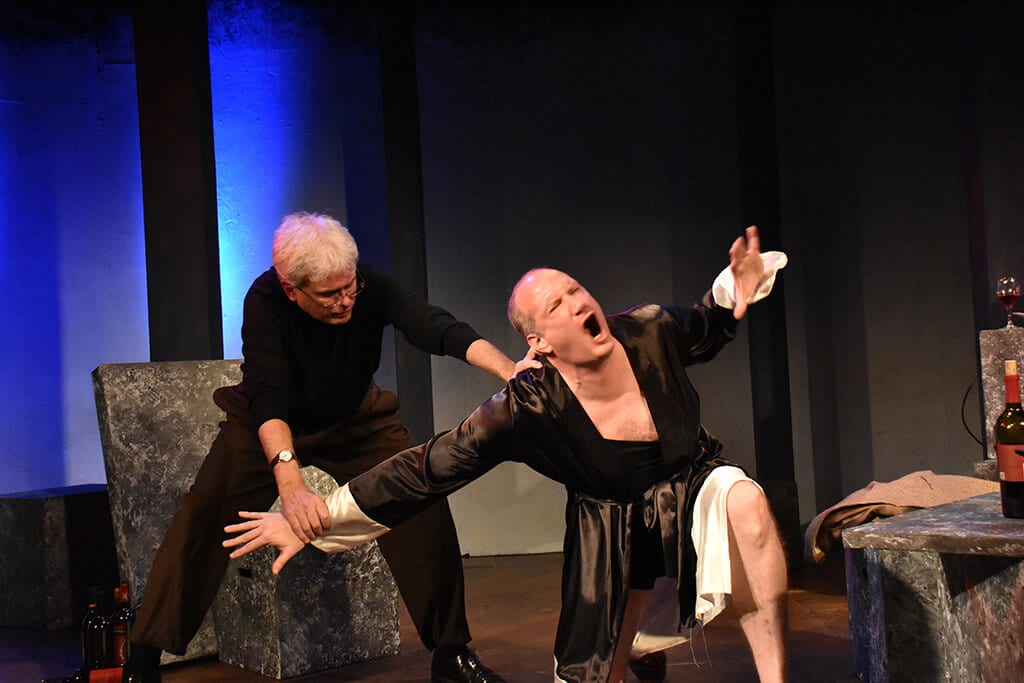So many of Ireland’s literary greats had to be elsewhere to write. Wilde, Shaw, Edna O’Brien, Joyce, and then Beckett after him all escaped the intrusive entanglements of their home world to become, at a safe distance, leading interpreters of human experience in English.
For Beckett it was France, even to the point of writing in French. There he came to know the farm boy with gigantism who later became Andre the Giant, professional wrestler. Playwright Diiorio focuses right here, on this slight, almost accidental relationship between Beckett, the writer who could be certain of nothing in his fraught intellectual groping through existence, and “Dede”, the boy he drove to school in his truck, whose overstated existence was the biggest, most inescapable fact in any room he occupied. The hyper-productive intellect encounters the hyper-productive body.
The stuff of the play is a series of conversations, an extended encounter contrasting two misfits’ attempts to come to terms with life. Brendan Averett is, impressively, fully convincing as Dede (Andre’s nickname), both as the ungainly schoolboy who hates being stared at all day and doesn’t want to be seen stuffed into Beckett’s truck, and as the very grown man who has learned to revel both in his outsized stardom in the wrestling ring and in the available pleasures of his foreshortened life. Averett is a big man to be sure, and cleverly ill-fitting costumes enhance the effect. But Dede’s bigness of soul and simple truthfulness are supplied by Averett himself.
Beckett is played I think also truthfully by Dave Sikuna as a reasonably open, urbane gent with a penchant for evading certainty. But is this the Beckett who needed open, alien air around him even to be able to think his own thoughts? Who tells us it is painful to write and even more painful not to? Whose second paragraph of his novel Malloy runs to 80 pages? The shadow and intensity of that lifelong intellectual struggle is evident in any photo of Beckett, but in this portrayal, not so much. His kind, affably helpless “I don’t know” responses don’t seem to come from a very earnest inner inquiry.
Beckett’s wit– the wit within his doubt, available in Diiorio’s script–might have been a little more evident too if he were more clearly Irish. Not saying we needed a stereotype or a brogue (though I wouldn’t have minded the brogue), but we should have felt the mark that culture leaves on attitude and rhythms. We actually did feel that mark in the French-raised Andre, who was also played without accent.
At a few points Diiorio playfully evokes tropes well known to the audience from Beckett’s most famous stage works, mostly to good effect. There’s some recognizably staccato, questioning dialogue, a moon turned on and off, and a very canny homage to Endgame in the finale.
The set is a fine, low budget evocation of geometric abstraction, with cubes and such called into service to evoke places and things. But Beckett’s abstractions in his plays are typically earthy–ash, dirt, sand, scrawny tree. Beckett gives us human beings absurdly placed in absurd but real-feeling environments, not in mathematical constructs inside a computer. A different visual metaphor might have served better.
The central “moment” the play dwells on is an apocryphal evening where the elder Beckett visits the now-famous wrestler for a bite and many, many drinks after having watched him perform in a match. It’s a nice time we get to share. There’s some entertaining play-wrestling. But it’s in the attitude toward life where Beckett seems over-matched.

